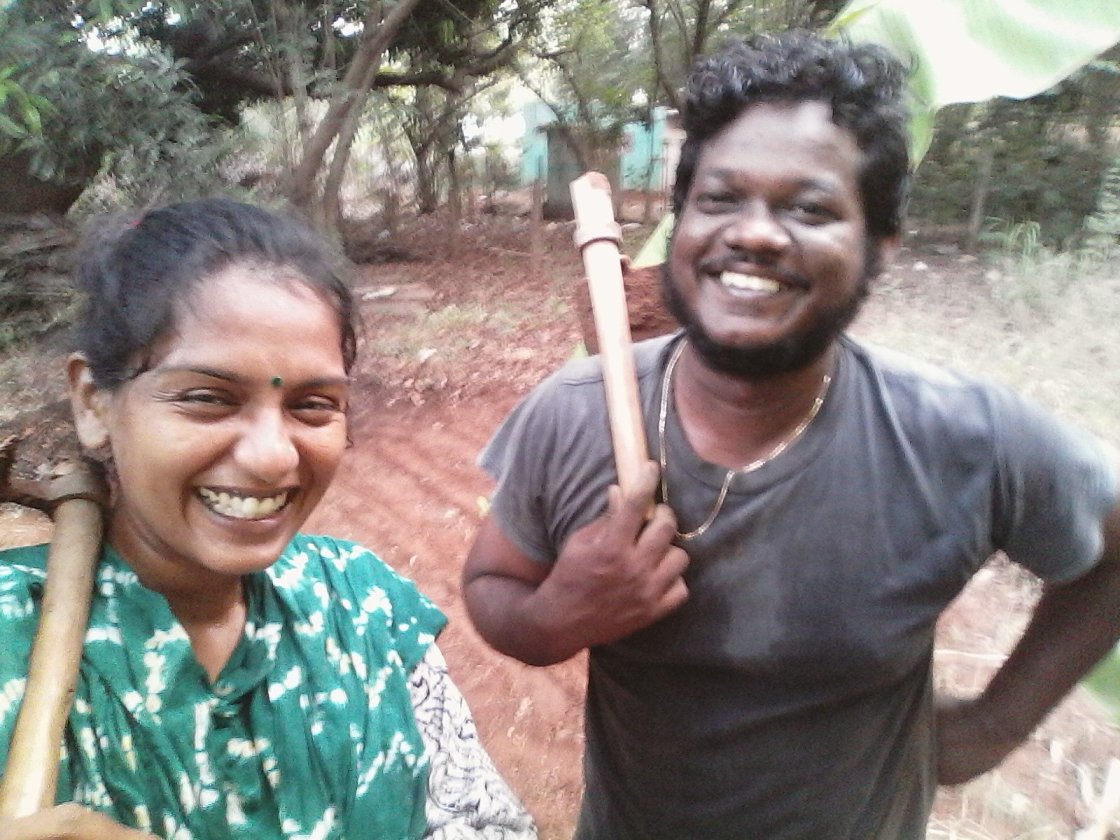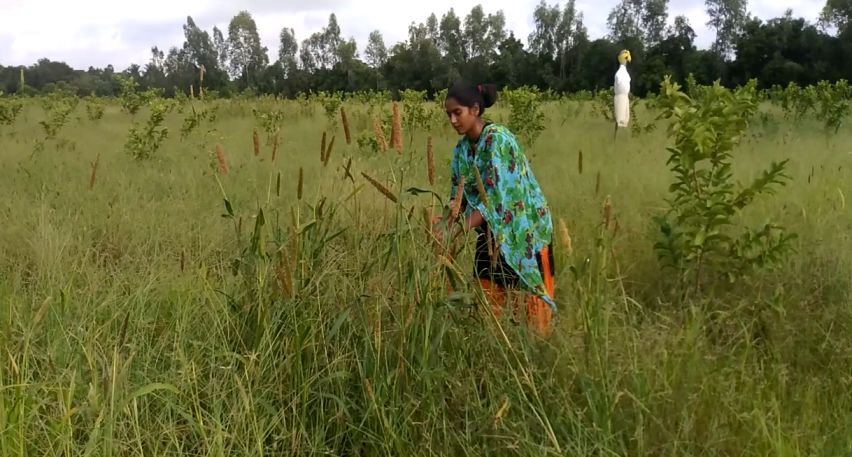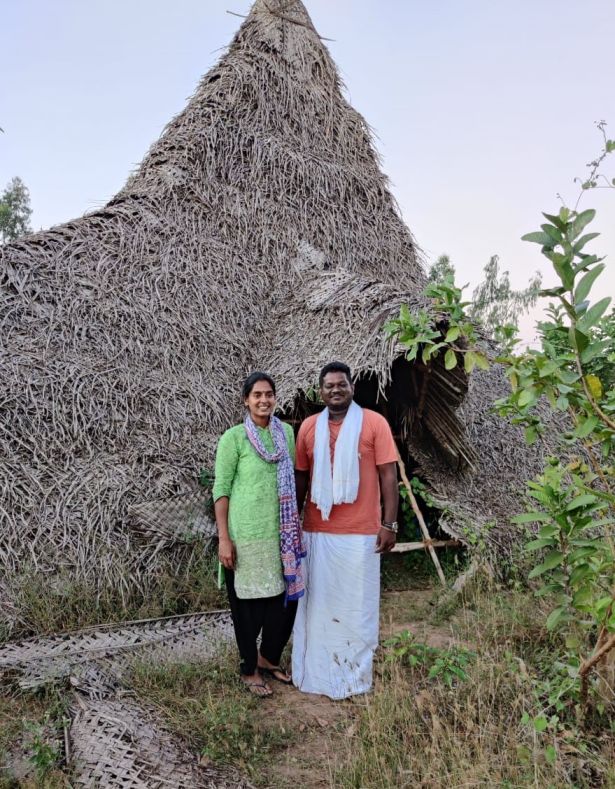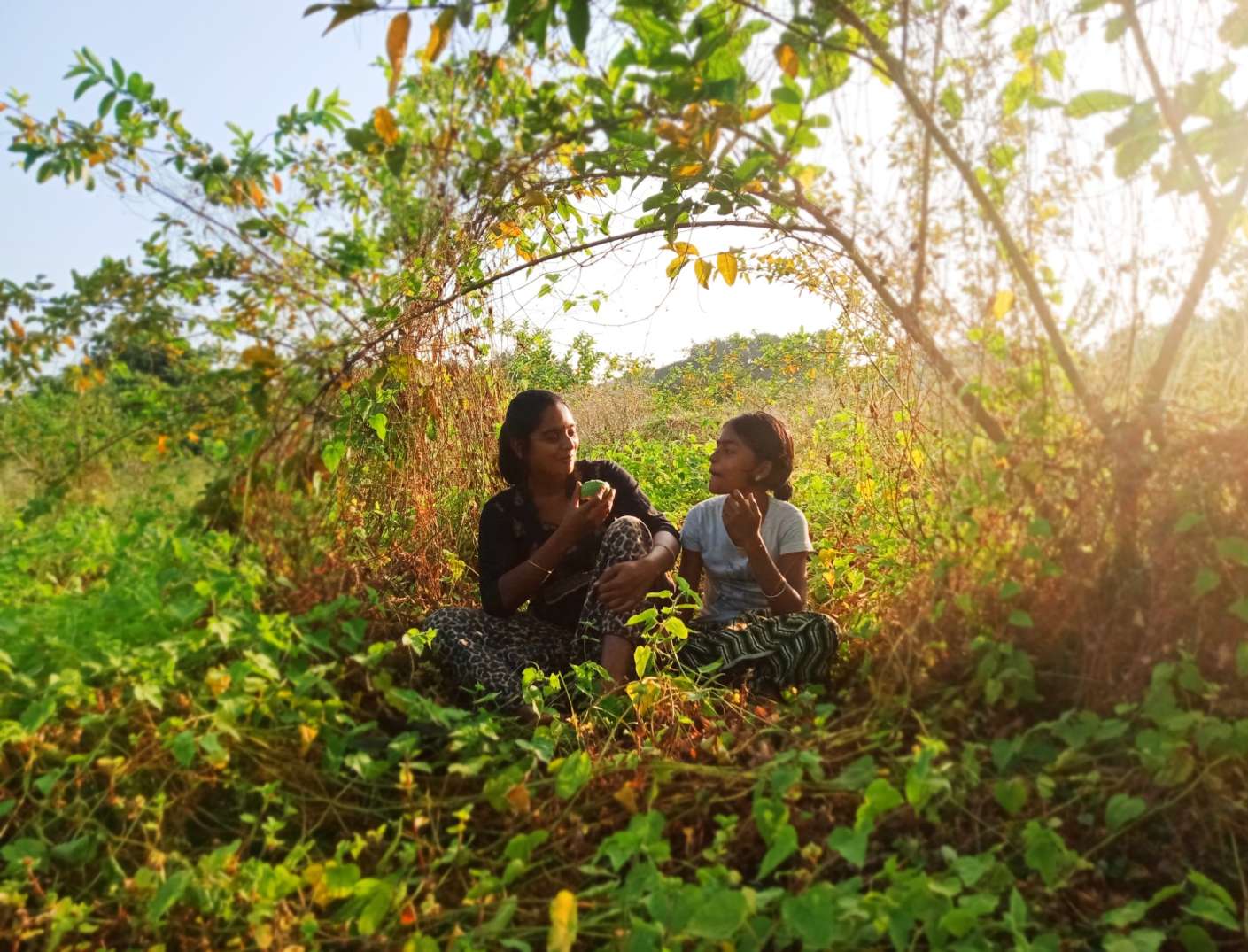TN Couple Share How to ‘Do-Nothing’ on a Farm, While Still Earning Rs 45,000/Month
Harivartha Prajeeth and Dr Mangayarkarasay Leela from Tamil Nadu practice the art of natural farming and have trained 500 others.

It was a March afternoon when a young couple in a village of Tamil Nadu was busy caressing plants at its farm. The word which comes to mind after seeing their farm is ‘jungle’. When we met the couple, my first question to them was, “Why are you here amidst these plants when the entire country is frightened and indoors because of the pandemic?”
A smiling young gentleman replies, “These plants are our annadata [food provider] and this field is our food basket – 100 per cent pure and natural. We are concerned about the virus but this entire field is our life and our source of eternal peace.”
Harivartha Prajeeth, a postgraduate in Electronic Media from Pondicherry University and a well-paid ex-employee of a multinational company, decided to return to his village for farming. Later, his wife Dr Mangayarkarasay Leela, an MBBS, also known as Dr Manga, joined him. “It was a well thought out and wise decision. Being in tune with nature and making the world aware about natural food, natural farming, and healthy living is most satisfying,” says Dr Manga.
Unable to view the above button? Click here
The art of ‘do nothing’ farming

The couple has been following ‘natural farming’ practices since 2017. Their 3-acre farm in the native village of Dr Manga, Ramanathpurama, in the Villupuram district of Tamil Nadu, has been their ‘karmabhumi’ [place of work]. Following Fukuoka’s method of natural farming and permaculture, the couple neither plough nor use any fertilizer or pesticide in their farm. They use the broadcast method for seeding without following any specific patterns and believe that wherever the seeds fall, they carve their way and grow naturally. They find indigenous varieties easier to grow and manage. Seed saving of traditional varieties has been the major objective and activity of their farming.
“When I first took over this piece of land, I planted watermelons. It is said that harvested watermelon seeds are impotent. So, we left a few harvested watermelons in the field for the wild pigs. The wild pigs ate the fruit and left their droppings in the ours and the surrounding fields. Next year, we found watermelon plants germinating in different fields. Farmers of the surrounding area were surprised to notice this,” says Prajeeth.
Instead of deep ploughing they prefer mulching and creating a layer of top-soil by using fallen green and dry leaves and then plant seeds. By doing so soil erosion was avoided and also provided much-needed nutrients for seeds to germinate and plants to grow. Many farmers have been visiting them and learning about their way of farming.
Sivaraman, a young farmer from the same village says, “Many of us have used their techniques and they are not only cheap but very useful also.”
“We call it ‘do-nothing farming’, and it works”, says Dr Manga.

After the farm operations, the couple watch birds hopping from one plant to another. They considered this an effective way of increasing soil fertility and seed multiplication. They have earmarked a small area on the farm which is like a natural habitat for birds and insects.
At first, Prajeeth was hesitant to share how they chanced upon the idea of farming and natural farming but after being mildly cajoled by his wife, he says, “The reason is personal. I was seriously ill and I and the doctors were almost hopeless. However, a miracle happened and I recovered. After I was discharged from the hospital, I decided to do something different which would not only keep me closer to nature but would also give me eternal peace. I left my cushy job in 2015 and started farming.”
Asked why not traditional farming and why natural farming?
He says, “Although I was doing organic farming, I wanted to do something different and kept exploring options. I had read a book titled — The One-Straw Revolution: An Introduction to Natural Farming, by Masanobu Fukuoka and was quite impressed. The idea of natural farming itself was inspiring. I discussed this with a few of my close friends and most of them advised me against it. However, my resolve was firm and finally I started natural farming in 2017. Since then, there has been no looking back.”
According to the farmer couple, organic farming requires a lot of manpower and resources which are usually difficult for small farmers to arrange, and there is still no structured market for organic products in the country that can ensure the right price to the farmers. The couple’s basic premise of their farming was ‘minimum cost and maximum nutrition,’ and Fukuoka’s permaculture method was found the most appropriate.
Encouraging livelihoods
They grow green gram, black gram, groundnut, millets, roselle, jackfruit, banana, coconut, guava, and vegetables. Their guava harvest is very popular among the locals because of its taste. They harvest around 40 kg of guava every alternate day during the season. “In April, in addition to guava, we sold coconut, pumpkin, jackfruits, and bananas for Rs 20,000. Overall, we make Rs 40,000 to Rs 45,000 per month from farming,” informs Prajeeth.
Their ‘do nothing farming’ has opened small but sustainable opportunities for businesses too. They prepare ‘fresh-from-farm’ baskets of homemade groundnut balls, ragi balls, roselle jam, seasonal fruits and vegetables, tea bags, and other herbs.
These baskets are sold at a price ranging from Rs 300 to Rs 500 per basket, depending on the products and the season to the customers through their partner organisations. Their fresh-from-farm baskets have entered homes in Chennai and Pondicherry. “The taste of our products is natural, and the shelf-life is also more than that from chemical-using farms,” Dr Manga says.
Asked about their profits, Dr Manga smiles and replies, “We don’t calculate profits. We don’t use any external inputs and we sell all the products at a reasonable price.”

To scale up production, they have joined hands with Gratitude Farm Private Limited of Auroville which delivers organic vegetables, fruits and other food products in Tamil Nadu and neighbouring states. “We have now linked seven more farmers in this area and we have started supplying products to them. We have named our organisation as ‘farmer cloud’ and it is doing quite well, though we have just made a beginning,” Prajeeth says.
Subhalaxmi, a school teacher in one of the senior secondary schools in Chennai explains, “After I visited their farm once, I have become an ardent admirer of their farming style and a happy customer. Their naturally grown fruits have unique tastes and are easily digestible too.”
As more and more people want to learn more about their model they have started training youth in their farming practices. Their field-based sessions are well attended and create a lot of interest. Now, even farmers of surrounding districts have started visiting their farms. Till date, more than 500 youth have undergone their training.
While the model looks interesting and sustainable, the question remains — can it be scaled up for commercial purposes? “As patience and belief in nature and natural products are hard to come by and commercial farming demands more from less, it has not become as popular as we hoped. Though there are very few who have joined us till date, we are sure if farmers and families start practicing on smaller scales, they will find it’s worth it. But yes, for us, ‘do nothing farming’ is an art of living and not a way of farming,” says Dr Manga before signing off.
(Written by Swetapadma Rout, a student of Master of Business Administration (Rural Management) and Niraj Kumar, a professor of Rural Management at XIM University, Bhubaneswar; Edited by Yoshita Rao)
This story made me
- 97
- 121
- 89
- 167
Tell Us More
We bring stories straight from the heart of India, to inspire millions and create a wave of impact. Our positive movement is growing bigger everyday, and we would love for you to join it.
Please contribute whatever you can, every little penny helps our team in bringing you more stories that support dreams and spread hope.



















